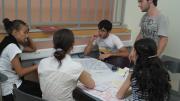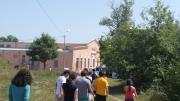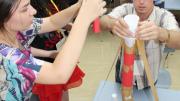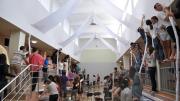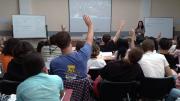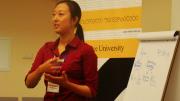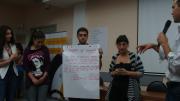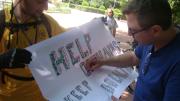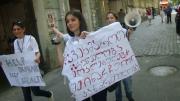Zviad Adzinbaia knew little about Harvard University, or even America, when he came across the website for the International Summer School on Leadership (ISS), a Harvard collaborative that aims to develop a new generation of post-Soviet leaders in the Republic of Georgia. But he instantly knew the program was for him. “I saw that word—leader—and I thought, ‘Wow, this is definitely for me,'” says the Sokhumi State University student. “I wanted to start immediately.”
Adzinbaia got his wish last year, joining dozens of other students from Georgia, Azerbaijan, Armenia, Ukraine, and Russia in the 10-day-long program held in the Free University of Tbilisi’s Bazaleti Training Center—which once served as the primary Soviet signals intelligence center to block Radio Free Europe and other Western radio broadcasts from reaching citizens of the USSR. Participants experienced both lecture-style and hands-on learning: attending classes, reviewing leadership case studies, and joining in exercises and projects to foster skills such as decisionmaking, compromise, and teamwork. And this summer, Adzinbaia served as a mentor for a new class of 80 participants (selected from about 300 applications). He was excited to work with a new crop of potential leaders: “It was nice because I have been through this before, so I could really observe more and help the new students,” he says.
Founded in 2010 by Mariam Melikadze ’12 and Daan Harmsen ’12, ISS (an initiative of the Boston-based International Spark Program) arose from the two then-undergraduates’ desire to start an educational- and economic-based program with a focus on cultivating leaders in developing countries.
Working with the sociology department’s director of undergraduate studies, David Ager, and doctoral student Matthew Lee, Harmsen and Melikadze (originally from Tbilisi) decided to create a leadership curriculum aligned with the needs of the Republic of Georgia. “Georgia was at a very interesting crossroads politically after the Soviet nomenklatura [political machine] was ousted in the 2003 Rose Revolution,” explains Melikadze. “The economy began to develop rapidly and all of a sudden this country is shifting into a Western mindset. There was a huge interest in studying abroad and bringing in foreign-born professors to teach subjects that have not been taught before.”
ISS is now in its third year. The Free University of Tbilisi funds about 70 percent of the program, and additional scholarships are awarded on a need basis through private corporate partners. This summer, students attended talks on topics such as “Personal Ideation,” “Solution Building,” and “Managing Relations with Founders and Investors,” and engaged in case studies such as “Artic Survival” and “A Tale of Two Coaches,” all designed to spark thoughtful discussion on the meaning of leadership. Instructors included Harvard Business School doctoral candidates Lee, Sujin Jang, Levan Nadibaidze, Tori Hogan, Ed.M. ’08, and Irina Anghel, an international lawyer who was a Mason Fellow at Harvard in 2010. Melikadze is especially proud of the program’s interactive emphasis: “All throughout the program there is this underlying framework that allows them to reflect on their team experiences and also think about leadership,” she says. “There are always one or two really quiet students in the beginning, and it’s fun to watch them come out of their shell.”
Students also bonded during team-building activities such as Cultural Night, where they introduced their respective countries through presentations, national dances, songs, and traditional candy. They heard from guest speakers like Tamar Kanashvili, the founder of Speak-Up in Georgia (a project that helps Georgian youth cultivate their English skills), and obtained career advice through presentations like “Getting a Master’s Degree Abroad.”
The program culminates in a final team project: the students are divided into teams of four to six members and tasked with identifying a problem faced by their society and solving it in an innovative and sustainable way. This summer’s projects ranged from environmental cleanups in local parks to setting up nanny services and anti-smoking campaigns, addressing the lack of extracurricular clubs in Georgian universities and of sports activities in schools, and tackling racism and homelessness in the country.
One group even proposed an anti-jaywalking campaign. “The students did research and found that it’s not that people don’t know they shouldn’t jaywalk, they just have a mindset that they shouldn’t care about the law,” says Melikadze. “So…every week one student dressed up in a costume that depicted Death and went out into the community with signs and tried to convince people not to jaywalk. They got a lot of support from City Hall, so now [the students] are actually implementing this on a larger scale.”
Zviad Adzinbaia, meanwhile, in addition to mentoring incoming ISS students, has founded two leadership organizations within his own university, and has a new goal: coming to America to obtain a master’s degree, he hopes from the Kennedy School of Government. “The day that I finished ISS, I knew I found new ways to be a leader,” he says. “My goal is to have a contribution in my country’s unification.”
